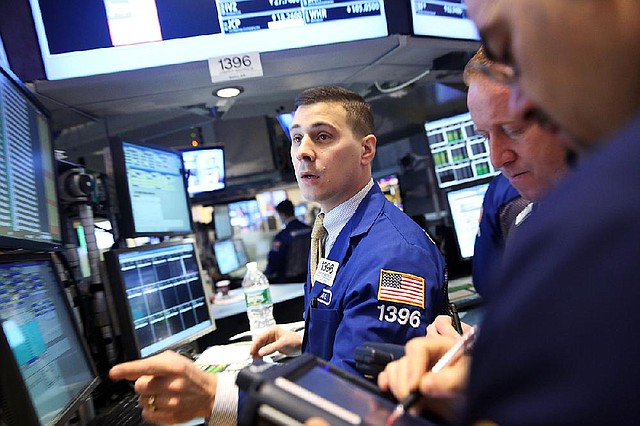Apple falls on weak iPhone news
Traders work Monday on the floor of the New York Stock Exchange. A drop in Apple Inc. shares held down the Standard & Poor’s 500 index on Monday.
Tuesday, January 15, 2013
NEW YORK — Apple held down the Standard & Poor’s 500, pushing it further below the five-year high it reached last week, after the technology giant’s stock sank on a report that demand for the iPhone 5 may be weaker than expected. The Dow Jones industrial average edged higher.
The Dow rose 18.89 points to 13,507.32 Monday, having fallen as much as 29 points at the start of the day. The S&P 500 fell 1.37 to 1,470.68. The Nasdaq composite index fell 8.13 points to 3,117.50
Falling stocks outnumbered rising ones on the New York Stock Exchange. Consolidated volume was a light 2.9 billion shares.
The S&P 500 closed at a five-year high of 1,472 on Thursday after a solid start to the fourth-quarter earnings reporting period and amid optimism that the outlook for global growth is brightening.
Apple’s stock, which isn’t included in the Dow but accounts for 10.3 percent of the Nasdaq index and 3.7 percent of the S&P, slid $18.55 to $501.75 after The Wall Street Journal reported that the company has reduced its orders for iPhone 5 components because of weak demand.
Apple slipped below $500 a share for the first time in nearly a year in early trading. The stock has slumped 28 percent since closing at a record $702.10 in September.
Computer maker Dell surged $1.41, or 13 percent, to $12.29 after a report that it’s in talks with buyout firms. The company is considering going private with at least two firms, Bloomberg News reported, citing unidentified sources.
Earnings reporting will pick up this week with many big U.S. banks, including JPMorgan Chase, Citigroup and Bank of America, releasing results.
“The market is definitely in wait-and-see mode,” said Brian Gendreau, a market strategist at Cetera Financial Group.
Investors will be scrutinizing revenues to assess whether the drawn-out debate over parts of the federal budget had an effect on consumer spending. A series of tax increases and spending cuts set to take effect Jan. 1 were averted by a last-minute deal.
Earnings growth has likely peaked for now because companies have been relying on cutting costs rather than growth to increase profitability, said Ron Sloan, a senior portfolio manager at Invesco. Analysts currently forecast that fourth-quarter 2012 earnings for S&P 500 companies will increase 3.3 percent, according to S&P Capital IQ. That compares with 8.4 percent from the same period a year ago.
Federal Reserve Bank of Chicago President Charles Evans, an alternate member of the Fed’s Open Market Committee, said Monday in a speech in Hong Kong that central banks should help create conditions to foster “robust demand growth” as the U.S. and other advanced economies try to reduce debt.
The yield on the 10-year Treasury note, which moves inversely to its price, was little changed at 1.86 percent.
Business, Pages 22 on 01/15/2013
